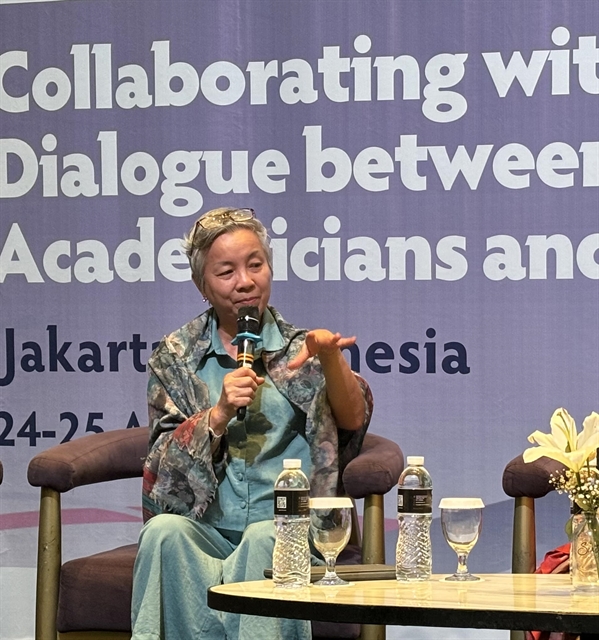 Opinion
Opinion
.jpg)
 |
| Nguyễn Vân Anh, director of the Centre for Studies and Applied Sciences in Gender, Family, Women and Adolescent. VNS Photo Khánh Dương |
Nguyễn Vân Anh, director of the Centre for Studies and Applied Sciences in Gender, Family, Women and Adolescent (CSAGA), talks to Việt Nam News reporter Khánh Dương about protecting women and girls in natural disasters and crises.
Super typhoon Yagi has wreaked havoc on Việt Nam’s northern region and caused severe impacts on local residents, especially women and girls who are among the most vulnerable groups. What types of risks, both physical and psychological, must women and girls bear during natural catastrophes and emergencies?
During natural disasters and crises, what we are concerned the most is human survival. Beyond survival, there are still issues like women's and girls' safety and health, as they are more susceptible to natural disasters and calamities.
Due to women and girls’ specific health and body characteristics, they face higher risks in the natural disasters and crises.
It is common for everyone to be evacuated to safe shelters during natural catastrophes and emergencies. When living conditions are still subpar and many people share accommodations, we are aware that violence and sexual abuse could happen if everyone stays in those areas. Even more likely are those acts in unfavourable conditions.
In light of all the worries over human survival, many are hesitant to come forward. There hasn't been an official report on sexual abuse and violence during natural disasters or crises in Việt Nam, but in certain other nations, there have been reports of significantly higher than average rates of women being trafficked or experiencing violence during these events.
Why are women and girls more easily hurt in natural disasters and crises?
In society, women and girls are apparently more vulnerable than men due to their health characteristics and stereotypes.
Women find it more difficult to practise good personal hygiene during natural catastrophes and emergencies such as floods and epidemics, which increases their susceptibility to illnesses.
According to your observation, how far has Việt Nam paid attention to gender-based violence and sexual abuse in natural disasters and crises?
In Việt Nam, gender-based violence, especially during natural disasters and crises, has not been given enough attention.
Supporters tend to focus more on a pressing matter—survival—while ignoring more persistent issues.
People who lost their jobs as a result of a typhoon, for instance, could fall victim to human trafficking, which has been reported in numerous other nations.
Research indicates that during crises and disasters, couples with a history of domestic violence are more likely to escalate their aggression.
When such incidents occur, authorised agencies tasked with safeguarding women and girls are less concerned with identifying the victims of violence and more focused on guaranteeing their survival.
This results in a continued reluctance to report about sexual abuse and violence during natural disasters and emergencies.
What steps can women and girls take to safeguard themselves against possible violence and sexual abuse?
When girls are being evacuated, we should not take them away from their parents' protective care.
Women should prepare a packet of basic first aid supplies, clean water to drink, crucial documents sealed in a plastic bag, food, especially dried or fast food and other necessities as soon as they hear weather forecasts regarding natural disasters.
They should be cautious while at the evacuation shelters to avoid being the victim of violence or sexual assault by anyone, including strangers and family members.
It's important to keep in mind that in this situation, nobody has the right to ask you to trade sex for anything, not even those who can save your lives.
If it occurs, you ought to tell other people about it right away so you can get the better help you need.
How about authorities, associations and groups who provide support to the victims? What should they be prepared?
Authorities and associations should pay attention to not only providing meals and drinks but also safety for vulnerable groups like the elderly, the disabled, women and girls.
There may be a greater likelihood of violence and sexual abuse during natural disasters and emergencies. Authorities should provide safe addresses where women and girls can report violence and sexual abuse incidents.
Principles must be understood by those who offer assistance, including both professional forces like the military and police and non-professional forces like volunteers.
In addition to financial and food rules, they also need to understand sexual assault prevention principles. VNS
.jpg)



